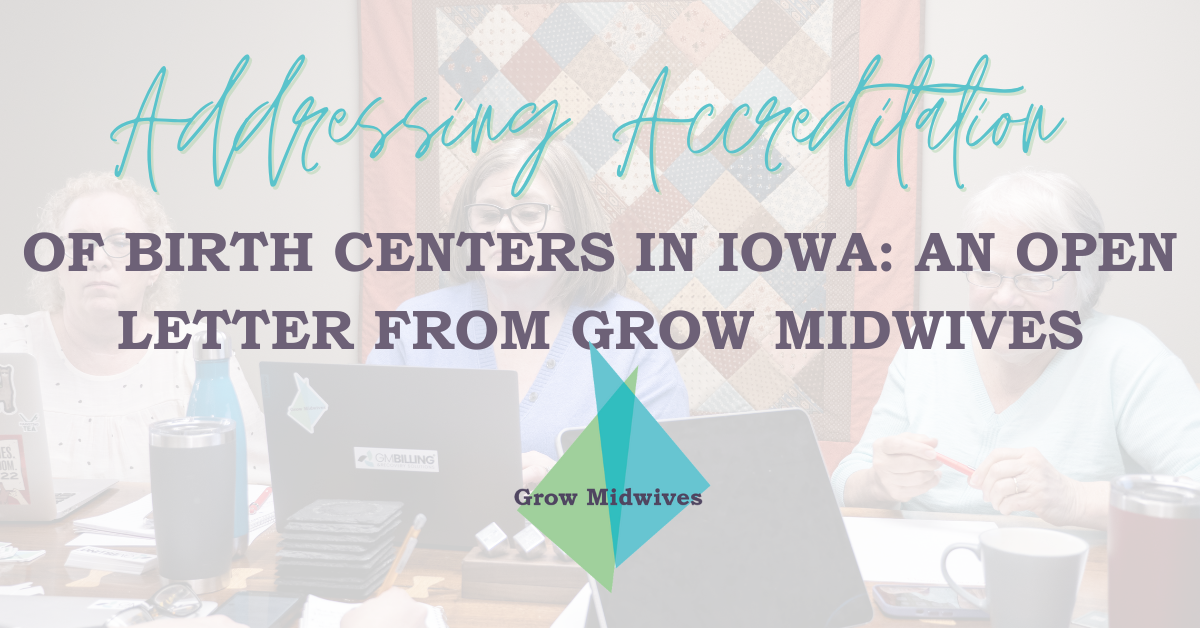Certificates of need (CON) laws are state regulatory mechanisms used for approving major capital expenditures and projects for certain health care facilities. Currently 35 states and Washington D.C. utilize CON laws. If your state has a CON program, a health planning agency or other entity must approve the creation of new healthcare facilities or the expansion of an existing facility’s services in a specified area.
CON laws control health care costs by restricting duplicative services and determining whether new capital expenditures meet a community need.
Recently, Grow Midwives had concerns about legislation that could go into effect in Iowa that inferences to whether accrediting birth centers should be included in the language regarding CON programs. One of our team members who is based out of Iowa, Arden Schwenker, CPCO, Chief Financial Officer and Senior Consultant, composed a letter to send to the Iowa Senator and state legislators detailing the importance of including birth centers in this language.
Arden’s Letter:
March 7, 2023
To: Iowa Concerned Legislators
RE: Accreditation of Freestanding Birth Centers
To Whom It May Concern:
As one of the premier, national consulting firms that for the past five years have worked alongside diverse organizations and providers to address maternal health inequities and need for improving outcomes, we would like to share our concerns about legislation that may include inferences to whether accrediting birth centers should be included in Iowa legislative language. We represent national leadership positions as past presidents of the American College of Nurse-Midwives and the American Association of Birth Centers. One of our team members brings over a decade of experience in billing and coding for services provided by midwives and birth centers and is also a resident of Iowa, Arden Schwenker.
Our aim in this communication is to provide evidence and our resounding opinion that any legislation to license free-standing birth centers in Iowa acknowledge that they be fully accredited by the Commission for Accreditation of Birth Centers (CABC).
Below are four national organizations that have consensus documents supporting Birth Center accreditation. Some states only enacted state-specific licensure regulations. By not also requiring, or substituting CABC accreditation in lieu of state regulations, states miss integrating evidence-based national standards for safety being fully implemented and routinely overseen.
- Commission for Accreditation of Birth Centers website, https://birthcenteraccreditation.org/accreditation-is-the-mark-of-quality/
Demonstrate your accountability and commitment to providing high quality maternity care to childbearing families, insurance companies, maternity care colleagues, and your community. Continuous Quality Improvement program that will allow you to recognize any quality issues quickly and systematically work to resolve issues in order to assure that you provide the very best possible maternity care. Policies and procedures that support the midwifery model of care, enhance risk management, and allow you to provide evidence-based maternity care. Strengthen your position when negotiating with insurance companies. Provide support with your collaborative physicians and birth center or hospital administrators, for your use of evidence-based maternity care practices and avoidance of inappropriate use of technology. Assure medical liability insurance and payment from health insurance companies that require CABC accreditation for reimbursement.
- American College of Obstetricians and Gynecologists (ACOG) Statement on Birth Settings (2020) https://www.acog.org/news/news-releases/2020/04/acog-statement-on-birth-settings
“ACOG and its members, in collaboration with the health care team, are dedicated to providing patient-centered, respectful care. Obstetrician-gynecologists see firsthand the stress and uncertainty facing pregnant people, families, and their support networks during the COVID-19 pandemic, and this includes questioning the settings in which to give birth. However, even during this pandemic, hospitals and accredited birth centers remain the safest places to give birth. Physicians, certified nurse-midwives and certified midwives, and the entire health care team will work to ensure that precautions are taken to make labor and delivery safe, supportive and welcoming for their patients.”
- American College of Nurse-Midwives/ACOG, Joint Statement (2022)
“†A birthing center within a hospital complex, or a freestanding birthing center that meets the standards of the Accreditation Association for Ambulatory Health Care, the Joint Commission, or the American Association of Birth Centers (from American Academy of Pediatrics, American College of Obstetricians and Gynecologists. Guidelines for Perinatal Care. 8th ed. Elk Grove Village, IL: AAP; Washington, DC: American College of Obstetricians and Gynecologists; 2017) or is accredited by the Commission for the Accreditation of Birth Centers (CABC).”
- ACOG/Society for Maternal Fetal Medicine, Levels of Maternal Care (Feb 2015, Reaffirmed 2021) https://www.acog.org/clinical/clinical-guidance/obstetric-care-consensus/articles/2019/08/levels-of-maternal-care
“Importantly, accredited birth centers and hospitals that offer basic and specialty maternity services provide needed obstetric care for most women who are giving birth in the United States. Furthermore, they often provide maternity care in rural and underserved communities, which offers the benefit of keeping women with low- or moderate-risk pregnancies in their local communities. Closing hospitals with low-volume obstetric services could have counterproductive adverse health consequences and potentially increase health care disparities by limiting access to maternity care.”
There are some who will argue against CABC accreditation while also citing value of birth centers via the CMS, Federally-funded, Strong Start statistics. Findings from this multi-state study demonstrated excellent, safe and cost saving outcomes. It is important to note that these outcomes represent ONLY families that received care in CABC accredited birth centers. It is this model of evidence-based care, including birth center accreditation, that improves outcomes and lowers costs. https://innovation.cms.gov/innovation-models/strong-start
In addition, birth center accreditation is essential for reimbursement from most commercial payers and Medicaid. In order to offer birth centers as a viable option in Iowa, people need to be able to know that they can use their health insurance and providers need to know that they will be reimbursed for the care they provide.
We are grateful for the Iowa legislative body considering waiver of the CON for establishing birth centers. We fully endorse CABC accreditation of free-standing birth centers. We would be glad to address any questions if they arise.
Thank you for your service.
Dr. Ginger Breedlove
Lesley Rathbun
Arden Schwenker
Joseph Booth
Arden Schwenker, CPCO
CFO & Partner
Grow Midwives, LLC


